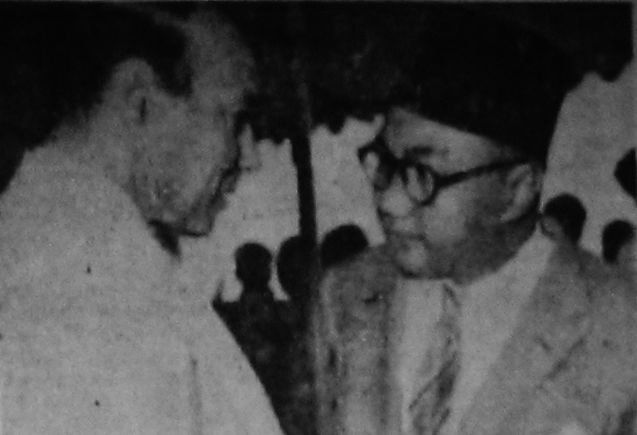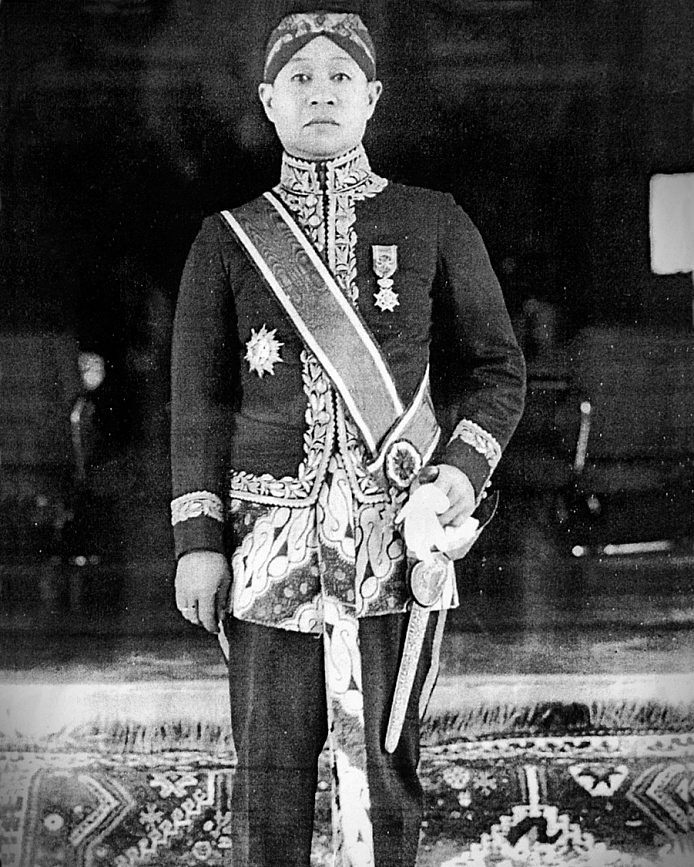|
Supreme Advisory Council (Indonesia)
The Supreme Advisory Council ( id, Dewan Pertimbangan Agung, DPA), was an advisory council for the President of Indonesia which existed from 1945 to 2003, with a brief interruption from 1950 to 1959. Largely composed of senior and retired government figures, the DPA was generally regarded as powerless. Its functions were limited to offering proposals to the government on matters of national importance as well as opinions on matters raised by the president. The DPA was replaced by the Presidential Advisory Council in 2003. Background There was no credible source about the background of the council's formation when it was embodied in the Constitution of Indonesia. In the supplement of the constitution, the council was compared to a council of state, leading to possibility that the council was based on the in the Dutch East Indies. In the founding fathers of Indonesia itself, there was an opinion that the council was based on the village traditions in Indonesia, on which the vill ... [...More Info...] [...Related Items...] OR: [Wikipedia] [Google] [Baidu] |
Presidential Advisory Council
Presidential Advisory Council (Indonesian: ''Dewan Pertimbangan Presiden'', abbreviated as ''Wantimpres'') is a non-structural government agency that serves as an advisory council for the President of Indonesia. The council was formed in 2007 during the presidency of Susilo Bambang Yudhoyono, and is modelled after the former constitutional Supreme Advisory Council (''Dewan Pertimbangan Agung'') that was disbanded in 2003. Legal basis Article 16 of the Constitution of Indonesia authorise the president to establish an advisory council to support its daily administration. Indonesian Act No.19/2006 provides the legal basis for the advisory council. The law specifies the powers and authorities of the council, as well as its membership, remunerations, and working procedures. Functions The main function of the advisory council is to advise the president on its daily administration. Advise to the president could be made on personal basis, or as the council in the whole. Members of the ... [...More Info...] [...Related Items...] OR: [Wikipedia] [Google] [Baidu] |
Liberal Democracy Period In Indonesia
The Liberal Democracy period in Indonesia (Indonesian: ''Demokrasi Liberal''), also known as the Era of Parliamentary Democracy, was a period in Indonesian political history, when Indonesia was under a liberal democracy system which began on 17 August 1950 following the dissolution of the federal United States of Indonesia less than a year after its formation, and ended with the imposition of martial law and President Sukarno's decree, resulting in the introduction of the Guided Democracy period on 5 July 1959. On August 17, 1950, the Republic of the United States of Indonesia (RIS), which was a form of state as a result of the Round Table Conference agreement and the recognition of sovereignty with the Netherlands, was officially dissolved. The government system was also changed to a Parliamentary Democracy and based on the Provisional Constitution of 1950. The period of liberal democracy was marked by the growth of political parties and the enactment of a parliamentary sy ... [...More Info...] [...Related Items...] OR: [Wikipedia] [Google] [Baidu] |
Roeslan Abdulgani
Ruslan Abdulgani (November 24, 1914, Surabaya — June 29, 2005, Jakarta, his first name is also spelled Roeslan) was an Indonesian government official and diplomat known for his role as a leader during the Indonesian National Revolution in the late 1940s, and as a key minister and United Nations ambassador in the Sukarno government during the 1950s and 1960s. Roeslan was born and raised in Surabaya, East Java. He came from an upper- middle-class family; his father was a neighborhood shopkeeper and owned a small fleet of taxis. His mother, his father's second wife, was a religious tutor, giving reading and religion lessons from the Qur'an. According to a memoir of his childhood, which Roeslan wrote in the 1970s, his mother was also a strong Javanese nationalist, and it was from her that he first learned about Netherlands, Dutch colonial rule and the possibility of independence. During the Indonesian National Revolution, Indonesian fight for independence from the Dutch ... [...More Info...] [...Related Items...] OR: [Wikipedia] [Google] [Baidu] |
Sukarno
Sukarno). (; born Koesno Sosrodihardjo, ; 6 June 1901 – 21 June 1970) was an Indonesian statesman, orator, revolutionary, and nationalist who was the first president of Indonesia, serving from 1945 to 1967. Sukarno was the leader of the Indonesian struggle for independence from the Dutch colonialists. He was a prominent leader of Indonesia's nationalist movement during the colonial period and spent over a decade under Dutch detention until released by the invading Japanese forces in World War II. Sukarno and his fellow nationalists collaborated to garner support for the Japanese war effort from the population, in exchange for Japanese aid in spreading nationalist ideas. Upon Japanese surrender, Sukarno and Mohammad Hatta declared Indonesian independence on 17 August 1945, and Sukarno was appointed president. He led the Indonesian resistance to Dutch re-colonisation efforts via diplomatic and military means until the Dutch recognition of Indonesian independence ... [...More Info...] [...Related Items...] OR: [Wikipedia] [Google] [Baidu] |
Sutardjo Kartohadikusumo
Soetardjo Kartohadikusumo (22 October 1890 – 20 December 1976) was an Indonesian politician who served as the first Governor of West Java in 1945. A former member of the Volksraad, he was also renowned for the 1936 Soetardjo Petition. Early life and education Soetardjo was born on 22 October 1890 in the village of Kunduran, within what is today Blora Regency. He was the sixth of eight siblings. His father Kartoredjo was a district chief in Tuban. He began attending an ''Europeesche Lagere School'' (elementary school) at the age of 8, despite the age limit for such schools being 6; according to a book later published by the Ministry of Education and Culture, Kartohadikusumo "had to be made 2 years younger" to fit this age limit. He continued to study at a school for native bureaucrats (') in Magelang, during which he joined Budi Utomo and became chairman of its local office. Career After a one-month internship, he was appointed as an assistant scribe at the Rembang Residency ... [...More Info...] [...Related Items...] OR: [Wikipedia] [Google] [Baidu] |
Raden Toemenggoeng Ario Soerjo
is a Japanese termRaden. for one of the decorative techniques used in traditional crafts and woodwork. It refers to a method of inserting a board-like material, which is a cut out part of the inside the , into the carved surface of lacquer or wood, or a craft made by using this method. The for ... [...More Info...] [...Related Items...] OR: [Wikipedia] [Google] [Baidu] |
Soekiman Wirjosandjojo
Soekiman Wirjosandjojo ( EYD: Sukiman Wiryosanjoyo; 19June 1898 – 23July 1974) was an Indonesian politician and physician who served as prime minister of Indonesia from 1951 until 1952. A member of the Masyumi Party, he also served as the party's first chairman. Born into a merchant family in Surakarta, Soekiman was educated as a physician at Batavia's STOVIA medical school and at Amsterdam University. Having served as chairman of the '' Perhimpoenan Indonesia'' association while in the Netherlands, he returned to Java and began participating in politics while working as a doctor. He was active within the Islamic political organization Sarekat Islam, although he was expelled in 1933 due to a dispute and founded his own Islamic political party. During the Japanese occupation of the Dutch East Indies, he was active within the Pusat Tenaga Rakyat propaganda organization, and in 1945 was appointed a member of the Investigating Committee for Preparatory Work for Independence. ... [...More Info...] [...Related Items...] OR: [Wikipedia] [Google] [Baidu] |
Wiranatakusumah V
Raden Aria Adipati Wiranatakusumah V (Van Ophuijsen Spelling System, Old Spelling: Raden Aria Adipati Wiranatakoesoemah V; 23 November 1888 – 22 January 1965), commonly shortened to R. A. A. Wiranatakusumah V or just as Wiranatakusumah V, was an Indonesian politician who served as the first and only Wali Negara of Pasundan, Wali Negara of Pasundan, during the Indonesian National Revolution. He was also the first List of Ministers of Home Affairs (Indonesia), Minister of Ministry of Home Affairs (Indonesia), Home Affairs of Indonesia and the second Supreme Advisory Council#List of chairmen, Chairman of the Supreme Advisory Council. He was born on 23 November 1888. He was educated at the Europeesche Lagere School (ELS), the Hogere Burgerschool (HBS), and later the Opleiding School Voor Inlandsche Ambtenaren (OSVIA). His first career in government began when he was a clerk at Wedana Tanjungsari, Sumedang in 1910. One year later, he became a Police Mantri in Cibadak, Sukabumi, and ... [...More Info...] [...Related Items...] OR: [Wikipedia] [Google] [Baidu] |
Agus Salim
''Haji'' Agus Salim (; October 8, 1884 – November 4, 1954) was an Indonesian journalist, diplomat, and statesman. He served as Indonesia's Minister of Foreign Affairs between 1947 and 1949. Early life Agus Salim was born Masjhoedoelhaq Salim on October 8, 1884, in the village of Koto Gadang, a suburb of Fort de Kock. His father, Sutan Mohammad Salim, was a colonial prosecutor and judge whose highest rank was chief judge for the indigenous court in Tanjung Pinang. His birth name, which translates into "defender of truth", was changed into Agus Salim early in his childhood. Salim received his elementary education at ''Europeesche Lagere School''; at that time, it was considered a privilege for a non-European child to attend an all-European school. He continued his studies at the ''Hogere Burgerschool'' in Batavia, and graduated with the highest score in the whole Dutch East Indies. Salim's father had applied (and was granted) for his two sons, Agus and Jacob, to be granted equ ... [...More Info...] [...Related Items...] OR: [Wikipedia] [Google] [Baidu] |




_di_Republik_Indonesia%2C_p192.png)

